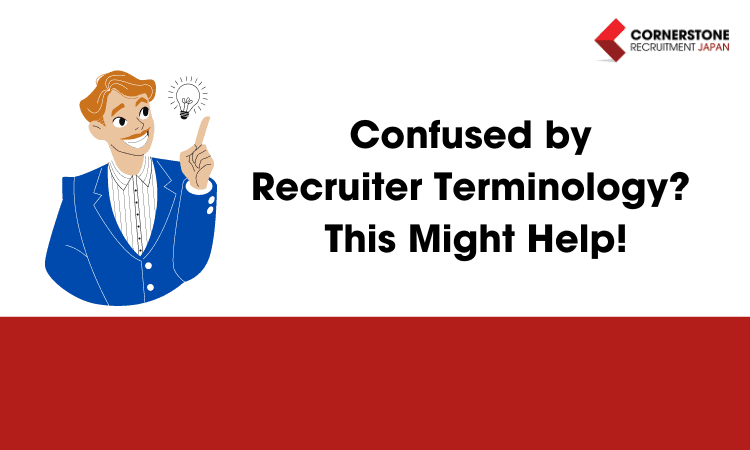Confused by Recruiter Terminology? This Might Help!
over 2 years ago by Lincoln T.
When searching for a job, it is very likely that you will hear terms that are unfamiliar to you. As recruiters, we often use industry jargon without even realizing it.
Here is a brief list of terms and their common meanings within the recruitment community:
"CV"
This is an abbreviation of "Curriculum Vitae". This is a short description of your work history. In North America, it is commonly called a résumé.
"Candidate"
Between recruiters and their partner companies, this normally describes a person who is applying for a job. If you are a job seeker, a recruiter may say that there are "other candidates" meaning that other people have applied and are competing for the same job.
"Blind Introduction" or "Masked Introduction"
The recruiter would like to talk about your profile with his/her partner company without sharing your name. This type of introduction can allow you to get company feedback without committing to a process, but it can also cause confusion if multiple agents talk to the same company. It is usually better to share your name and company name if you are positive about the opportunity.
"Float"
Recruiters are often searching for specific people to fill specific jobs, but they can also leverage company relationships to make more casual introductions. In this case, they may "float" your profile to the company (without matching it to a specific open job) in the hopes that a new role would be created specifically for you.
"Offer"
Many things may actually be offered at different times, but the word "Offer" is generally used to reference an offer letter from the company to the applicant. It may be a "Verbal Offer" meaning that terms have been described but not written down, or it could be a "Written Offer" where an actual offer letter has been drafted. Please make sure to clarify when talking with your agent as terms of a "Verbal Offer" may still change. *PLEASE NOTE: When a recruiter shares a job description with you, this is not referred to as a "Job Offer" and could cause great confusion if you use this phrase. It is better to say that you have received "Job Descriptions" or that you have been told about jobs but have not yet applied.
"Book a meeting"
This is an idiom meaning "schedule a meeting."
"Hiring Manager"
This is the person who would be your boss if you joined the new company. The Hiring Manager is often involved in the interview process - most likely at the first or second round.
"STAR System"
This is a method to answer interview questions and is very popular among European and North American companies - especially for answering open-ended questions like "Give me an example of something that you achieved." S.T. A. R. stands for Situation, Task, Action, and Results. What was the Situation of your company at the time in question? What was your task/goal at the time? What actions did you take to achieve your goal? What were your results?
"RFL" or "Reasons for leaving"
Companies will often ask why you are leaving your current job or why you left your previous jobs. Please keep in mind that they are looking for patterns or warnings. What they actually want to know is "If we hire you, would you also leave us?" Expect to be asked about your reasons for leaving your jobs and talk with your agent on how to describe each transition in an honest but more positive way.
In summary, understanding these essential recruitment terms empowers you to engage confidently in the job search process. "CV" represents your work history, "Candidate" defines those applying for jobs, and "Blind" or "Masked Introductions" offer a way to get feedback without immediate commitment. "Floating" your profile may lead to tailor-made roles, and distinguishing between "Verbal Offers" and "Written Offers" is crucial.
Familiarity with these terms enhances clarity and confidence, aiding you in finding the right opportunities.
Relevant article: How to Answer “Tell Me About Yourself” in an Interview
About Cornerstone Recruitment Japan
Established in 2019, in partnership with Cornerstone Global Partners and with investment from a leading financial institution, CRJ strives to be the recruitment partner of choice for all clients and candidates. We provide market-leading expertise and access to the best bilingual candidates in the Japanese market, and we are currently the fastest-growing recruitment company.
If you are looking for your next career move, register with us!
Written by Lincoln Torrey
